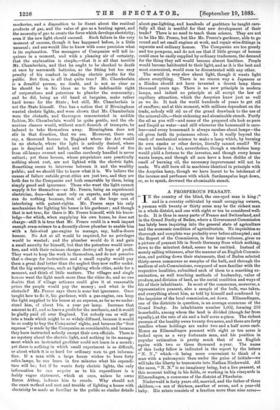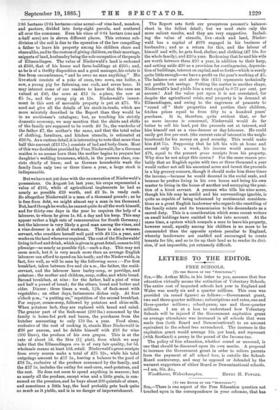A PROSPEROUS PEASANT.
"IN the country of the blind, the one-eyed man is king ;" and in a country cultivated by small occupying owners, a yeoman with twenty or thirty acres may be the richest man in a whole district, and. one with eight or ten be considered well. to-do. It is thus in many parts of France and Switzerland, and in the Grand Duchy of Baden, where a Government Commission has lately been inquiring into the general state of agriculture and the economic condition of agriculturists. No inquisition so thorough and complete was probably ever before attempted; and the Report of the Commission, in four large volumes, gives us a picture of peasant life in South Germany from which nothing, down to the minutest detail, seems to be omitted. Instead of merely calling witnesses, after the manner of an English Commis- sion, and putting down their statements, that of Baden selected thirty-seven communes as samples of the bulk, and through the medium of sub-Commissions, composed of men familiar with the respective localities, submitted each of them to a searching ex- amination, as well touching methods of husbandry, value of produce,and division of land, as the social condition and ways of life of their inhabitants. In most of the communes, moreover, a representative peasant, also a sample of the bulk, was taken, and everything about him, as told by himself and confirmed by the inquiries of the local commission, set down. Ellmendingen, one of the districts in question, is an average commune of the Grand Duchy. Its inhabitants number 1,002, forming 218 households, among whom the land is divided (though far from equally), at the rate of six and a half acres a-piece. The richest yeoman of the locality owns twenty- five acres, and there are forty families whose holdings are under two and a half acres each. Hence an Ellmendingen peasant with eight or ten acres is looked upon as a very fortunate man, and his position in popular estimation is pretty much that of an English squire with two or three thousand. a-year. The name of this lucky fellow is indicated in the report by the letters "N. N.," which—it being more convenient to think of a man with a patronymic than under the guise of initials—we will take the liberty to transmute into Nathan Niederwald. All the same, "N. N." is no imaginary being, but a live peasant, at this moment toiling in his fields, or working in his vineyards in Ellmendingen, a commune of the district of Pforzheim.
Niederwald is forty years old, married, and the father of three children,—a son of thirteen, another of seven, and a year-old baby. His estate consists of a fraction more than nine acres-
3.86 hectares (3.64 hectares=nine acres)—of vine-land, meadow, and pasture, divided into forty-eight parcels, and scattered all over the commune. Even his vines of 0.64 hectare (one and a-half acre) are in eleven different places. This extreme sub- division of the soil is due to the operation of the law compelling a father to leave his property among his children share and share alike, and to the custom of giving children, on their marriage, snippets of land, husbandrybeing the sole occupation of the people of Ellmendingen. The value of Niederwald's land is reckoned at £566, that of his house and farm-buildings at £205; and, as he is of a thrifty disposition and a good manager, his estate is free from encumbrance, "and he owes no man anything." His live-stock consists of a yoke of oxen, two cows, one heifer, a sow, a young pig for fattening, one cock, and seven hens. It may interest some of our readers to know that the oxen are valued at £40, the cows at £12 5s. a-piece, the sow at £5 5s., and the young pig at 12s. Niederwald's invest- ment in this sort of moveable property is put at £75. We need not give all the details of his stock-in-trade, which are more minutely described in the Report than they would be in an auctioneer's catalogue ; but, as touching his strictly domestic economy, we may mention that the shirts and shifts of the family are supposed to be worth £6 7s., the wardrobe Of the father £7, the mother's the same, and that the total value of clothing, furniture, and kitchen utensils, is estimated at £26 9s. As a curious detail, it is interesting to note that more than
half this amount (£13 17s.) consists of bed and body-linen. Most of this was doubtless provided by Frau Niederwald; for a German maiden is no sooner born than the mother begins to prepare her daughter's wedding trousseau, which, in the yeoman class, con- sists chiefly of linen; and as German households wash the family linen only two or three times a year, a large stock is indispensable.
But we have not yet done with the enumeration of Niederwald's possessions. On August 1st last year, his crops represented a value of £105, while of agricultural implements he had as nearly as possible 226 worth, and £2 2s. in ready cash. So altogether Niederwald is a man of a thousand pounds ; as he is free from debt, we might almost say a man in ten thousand. But, hard though he works, he cannot quite do all the work himself, and for thirty-one days in the year he requires the help of a labourer, to whom he gives is. 8d. a day and his keep. This may appear rather a high rate of remuneration for South Germany; but the labourer is very likely a good man among the vines, and a vine-dresser is a skilled workman. There is also a woman- servant, who considers herself well paid with £4 15s. a year, and works on the land whenever required. The cost of the Niederwalds' living in food and drink, which is given in great detail, comes to 50f pfennige—as nearly as possible W.—each a day. This may not seem much, but it is very much more than an average English labourer can afford to spend on his tooth; and the Niederwalds, in fact, live well, as will be seen by the following menu :—For first breakfast, taken between five and six a.m., the father, the maid- servant, and the labourer have barley-soup, or porridge, and potatoes ; the mother and children, soup, coffee, and white bread. Second breakfast, at nine : for the father, half a pint of wine and half a pound of bread; for the others, bread and butter and cider. Dinner : three times a week, lflb. of flesh-meat with vegetables ; on other days, farinaceous dishes only. At four o'clock p.m., "a putting on," repetition of the second breakfast. For supper, cream-soup, followed by potatoes and skim-milk. When potatoes lack, they are replaced with bread and salad. The greater part of the flesh-meat (200 lbs.) consumed by the family is home-fed pork and bacon, the purchases from the butcher amounting to only 170 lbs. a year. Food alone, exclusive of the cost of cooking it, stands Herr Niederwald in 236 per annum, and he debits himself with £10 for wine (500 litres), the produce of his own grapes. This is at the rate of about 5d. the litre (11 pint), from which we may infer that the Ellmendingen era is of very fair quality, for 5d. wholesale means at least 10d. retail. Niederwald's gross receipts from every source make a total of £75 12s., while his total outgoings amount to 257 5s., leaving a balance to the good of £18 7s., exclusive of the produce consumed by the family, and the £57 58. includes the outlay for seed-corn, seed-potatoes, and the rest. He does not seem to spend anything in manure; but as nearly all the produce, except wine and a little grain, is con- sumed on the premises, and he buys about 200 quintals of straw, and sometimes a little hay, the land probably gets back quite as much as it yields, and is in no danger of impoverishment.
The Report sets forth our prosperous peasant's balance- sheet in the fullest detail ; but we need state only the more salient results, and they are very suggestive. Includ- ing the value of utensils, live - stock and land, Nieder- wald has a capital of 2978 engaged in his business of husbandry; and as a return for this, and the labour of himself and wife, he gets food, shelter, and clothing (£7 10s. for the whole family), and 220 a year. Reckoning that he and his wife are worth between them £20 a year, in addition to their keep, and setting aside £20 as a provision for contingencies, deprecia- tion of buildings, interest on capital, and so forth—which is surely quite little enough—we have a profit on the year's working of £5. The balance over and above this (£15) represents technically not profits but savings. Putting the matter in another shape, Niederwald's land yields him a rent equal to 0.73 per cent, per annum ! And the value put upon it is not overstated, for despite the agricultural crisis, real property is in demand at Ellmendingen, and owing to the eagerness of peasants to "round off" their properties and portion their children, fetches prices equal to from fifty to a hundred years' purchase. It is, therefore, quite evident that, so far as mere income is concerned, Niederwald would do far better to sell his land, put the proceeds out at interest, and hire himself out as a vine-dresser or day-labourer. He could easily get five per cent. (the current rate of interest in the neigh- bourhood) for his money on good security. This would make him £48 15s. Supposing that he left his wife at home and earned only 12s. a week, his income would amount to 278, equal to the present gross receipts from his property. Why does he not adopt this course P For the same reason pro- bably that an English squire with two or three thousand a year would rather not sell his ancestral acres and invest the proceeds in a big grocery concern, though it should make him three times the income,—because he would descend in the social scale, and because he prefers living in his own house and being his own master to living in the house of another and occupying the posi- tion of a hired servant. A yeoman who tills his nine acres, though his life may be sordid and his surroundings ignoble, is quite as capable of being influenced by sentimental considera- tions as a great English landowner who regards the resettling of the family estate and its transmission to his descendants as a sacred duty. This is a consideration which some recent writers on small holdings have omitted to take into account. At the same time, a system which compels a man to leave his property, however small, equally among his children is no more to be commended than the opposite system peculiar to England, whereby landowners are enabled and encouraged to create tenants for life, and so to tie up their land as to render its divi- sion, if not impossible, yet extremely difficult.



































 Previous page
Previous page